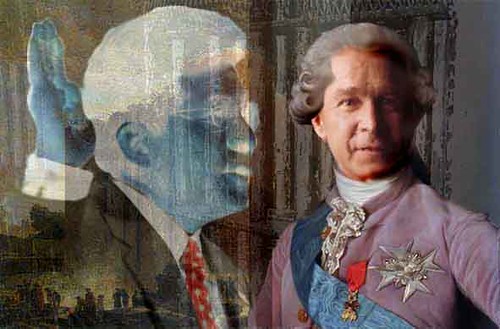Your Nose Is Growing Dave!
David Limbaugh Tells Himself (And Us), Another Set Of Lies
In his latest article for Human Events, "Democrats Don't Believe Their Own Rhetoric About Social Security", Limbaugh that shows he’s got his marching orders from the White House, just like the rest of the neocons. Now he wishes to convince us that not only is Social Security in crisis, but the Democrats said so before Bush did! And then he wishes to expose some imagined double standard between the Democrat’s worries over the deficit, and the fallacy that in 2042 there will be an explosion of the national debt! He then concludes that its all politics for the Democrats and that’s why they don’t want to join the brave President in his sensible solution. (which would destroy Social Security)
He starts by saying that Clinton “pretended to be adamant about fixing the problem” And that Al Gore “lectured” George W. Bush “for not approaching the problem with sufficient urgency.” He then assumes that Bush Jr. And Clinton were talking about the same thing:
“Al Gore lectured his presidential opponent George W. Bush for not approaching the problem with sufficient urgency. Allusions to the ephemeral "lock box" were Al Gore's favorite sound bites.”
Limbaugh totally misses the point. Clinton did not want to create private accounts from Social Security allotments. He wanted to create private accounts on top of Social Security allotments. While he may have felt that people have the right to maximize their income and savings by investing in the stock market, he did not feel that the secure base for family wellbeing should be tampered with. In a CNBC interview with Al hunt done in 1998 Clinton had this to say:
“On the individual accounts, I think it's absolutely, an idea that deserves a lot of consideration. There is some debate, as you know, in Congress about trying to dedicate the surplus to individual accounts now just starting. The problem I have with that proposal is that it doesn't deal with the underlying Social Security program. What are you going to do -- I think we still need some baseline Social Security in the 21st century that's a baseline protection for people that may not have a lot of money in the market, or may lose some in the market, or don't have a chance to accumulate a lot of wealth, and we've got to know how we're going to fix that. And then, the people -- admittedly, that's what Senators Moynihan and Kerrey tried to do. They tried to guarantee a baseline Social Security benefit and, over and above that, have an individual account. And that's one of the things that I think ought to be fully explored here.”
There’s the truth Mr. Limbaugh no further than the tip of your fingers.
But no, Limbaugh in his article, not only wants to assume that Bush Jr. is only doing what Clinton would have wanted, but that any difference between the Democrats plan to tweak Social Security, and Junior’s plan to “save” it stems from some deep hatred of American business:
“One would think, then, that President Bush would be entitled to some credit for his willingness to tackle the notorious third rail of politics. He has little to gain politically from pursuing a solution.
Think again. In response to President Bush's plan to add a private accounts option, Democrats insist that two rights make a wrong. That is, even if the president's reform would enhance the average American's retirement security, it must not be permitted if it would also help big business, which Democrats openly despise. You see, it's not just the whack jobs on the Left, but the entire Democratic leadership apparatus that is saying the president is doing this as a sop to Wall Street.”
First of all, no Democrat hates any kind of business so long as it is done honestly, and with a thought for the wellbeing of the community they live in. After all, you’re a person, I’m a person, and so’s a corporation right? And persons living in community treat one another well. Only a person who does not play well with others must disciplined. And if that person was a corporation, he is like a big person, and a big bully if he misbehaves. That is what the Democrats don’t like, not big business.
And yet Limbaugh continues to assume some perfidy on the part of Democrats on the issue of “crisis”, or “major problem”. “Like little kids they are arguing over the semantics of whether we are currently facing a ‘crisis’ in Social Security or just a major ‘problem.’", he says,
“Well, folks, they (the Democrats) must not mean what they say, because this looming Social Security problem is purely and simply about an inevitable explosion of the national debt. It's only avoidable if we reduce benefits, reduce other federal spending and/or raise taxes -- which at some point will be counterproductive on the revenue side.”
All the while Limbaugh doesn’t see that a simple problem of distribution and quantity can be solved by adjusting the rate of loss, and yes a small raise in the payroll cap. The Trust Fund will be there to take up the slack until 2042.
But lets take all look at what really is happening with the deficit and Social Security. Let’s go to the Social Security THE 2004 ANNUAL REPORT OF THE BOARD OF TRUSTEES OF THE FEDERAL OLD-AGE AND
SURVIVORS INSURANCE AND DISABILITY INSURANCE TRUST FUNDS:
“Under the intermediate assumptions the combined OASI and DI Trust Funds are projected to become exhausted in 2042. For the 75-year projection period, the actuarial deficit is 1.89 percent of taxable payroll, 0.03 percentage point smaller than in last year’s report. The open group unfunded obligation for OASDI over the 75-year period is $3.7 trillion in present value, $0.2 trillion more than the obligation estimated a year ago.”
Now I always thought that a “crisis” was something looming, impending, even sudden. Seventy-five years is a rather long time for a crisis to unfold. A lot can and will happen in 75 years!
Here’s where the Bush Doctrine gets much of it’s fallacies:
“Even a 75-year period is not long enough to provide a complete picture of Social Security’s financial condition. Figures II.D4, II.D5, and II.D6 show that the program’s financial condition continues to worsen at the end of the period. Overemphasis on summary measures for a 75-year period can lead to incorrect perceptions and to policy prescriptions that do not move toward a sustainable system. Thus, careful consideration of the trends in annual deficits and unfunded obligations toward the end of the 75-year period is important.
In order to provide a more complete description of Social Security’s
very long-run financial condition, this report also includes summary measures for a time period that extends to the infinite horizon. These calculations show that extending the horizon beyond 75 years continues to increase the unfunded obligation, indicating that much larger changes would be required to achieve solvency over the infinite future as compared to changes needed to balance 75-year period summary measures.” *
And now a word from Dick Cheney’s Favorite Website Factcheck, DOT COM. that is:
“Social Security Deficit and Payroll Taxes
The percent of taxable payroll is the portion of an employee’s payroll tax that goes toward Social Security and is currently set at the rate of 12.4 percent, half of which is paid by the employer and the other half by employee. Over 75 years, the Trustees estimate the actuarial deficit is 1.8 percent of taxable payroll. This means that for the system to be completely solvent over the next 75 years, without adjusting benefits, payroll taxes would have to go up to 14.2 percent immediately. And to be solvent for the "infinite future," the $10.4 trillion shortfall equals 3.5 percent of taxable payroll, or a tax increase to 15.9 percent of wages.”
Ah, but not everybody is happy with “infinite horizons” let alone any projections over even 75 years due to the uncertainty factor. The whole history of the Soviet Union occurred within 75 years. Anything, world wars, famine, giant pandemics could occur. In its letter to the Social Security Advisory Board, the American Academy of Actuaries states that:
“The Social Insurance Committee disagrees with Recommendation M-6. Rather, the Committee believes that the new measures of OASDI’s unfunded obligations included in the 2003 report provide little if any useful information about the program’s long-range finances and indeed are likely to mislead anyone lacking technical expertise in the demographic, economic and actuarial aspects of the program’s finances into believing that the program is in far worse financial
condition than is actually indicated. Thus, we believe that including these values in the Trustees Report is unnecessary and is, on balance, a detriment to the Trustees’ charge to provide a meaningful and balanced presentation of the financial status of the program.
With regard to the infinite-time-period estimates, the Committee begins its analysis by noting that the results of the 75-year statutory valuation are themselves subject to extreme uncertainty. Consider the situation of actuaries or economists in the year 1928 attempting to project demographic and economic parameters 75 years into the future - to 2003. They likely would have missed the Great Depression, World War II, the baby boom, the influx of women into the labor force,
etc. Nobody, no matter how intelligent or educated, could have anticipated these very significant events.” **
Now, the letter states that:
“methods of demographic, economic and actuarial analysis have improved greatly over the years” **
But it observes that:
“sources of error in past valuations of OASDI have been unforeseen — and really unforeseeable — large-scale changes in the U.S. society and economy.” **
And according to the letter there’s no reason to believe that similar unforeseeable changes won’t happen in the future. And making projections over 75 years is risky, so are projections to the infinite future making the results of limited value, unless you are willing to reverse the “trend” of your immediate 75 year projection.
Well, I’ve gone egghead again. Sorry. Back to Mr. Limbaugh’s forked tongue. He accused us of semantics in our propaganda. Well then, let’s go back to see what happens when the man who tells him what to say, George W. changed his tune somewhat. Realizing that was on thinner ice, and he was getting such tough opposition on the term “crisis”, Bush sang a slightly modified tune changing his term to “problem”. Now Mr. Limbaugh’s article takes care to equivocate before it gets to his main thrust that the Democrats won’t get behind the wise President’s sincere efforts, because they just want to play politics:
“Whether you call it a problem or a crisis, it is getting worse, and it's nothing short of immoral to put off working on solutions. The only conceivable reasons Democrats are in denial about it is that they either don't want to allow reform under a Republican president or don't want to fix it at all because they might lose one of the main weapons in their fear-mongering arsenal.”
No Mr. Limbaugh that’s not the reason. Our “fear-mongering arsenal” is filled with facts, not neocon wishful thinking.
The up-front borrowing costs mean we won’t close the deficit until 2030, we’ll just dig a deeper hole. As for “personal accounts” Bush Jr. isn’t figuring in the resulting interest that would cut into the savings, or that the benefit of paying back the debt would be reduced by inflation. Cuts to benefits will be only partly made up for by personal accounts. Administrative costs will rise. Of course if the employer won’t have to come up with half the scratch anymore, corporations will benefit, but other “persons” will not.
And Wikipedia brought forth a few more interesting facts:
From “Social Security”:
“The other major sector of opinion is that privatization accomplishes nothing, that rational investors would neutralize any benefit of, effectively, selling Treasury Notes and buying equities (See Modigliani-Miller Theory) - that it places more risk on individual workers than it gives back in rewards, since they cannot effectively vote their shares, but have no more protection than any other owner of common stock - and that it does nothing to change the budget situation in the future, that if and when the trust fund runs out, there will still be the choice of raising taxes or cutting benefits, or both.
Believers in this position argue that "privatization" is a fraud, that there is no specific Social Security Crisis, but instead a general budget crisis: namely that the US General Fund is in persistent deficit, that revenues are far too low to cover expenditures, and that absent this problem being solved, it does not matter how social security is set up”
That led to the “Modigliani-Miller Theory”:
“The Modigliani-Miller theorem (of Franco Modigliani and Merton Miller) forms the basis for modern thinking on capital structure. The basic theorem states that, in the absence of taxes, bankruptcy costs, and asymmetric information, and with perfect markets, the value of a firm is unaffected by how that firm is financed. It does not matter if the firm's capital is raised by issuing stock or selling debt. It does not matter what the firm's dividend policy is.
This seemingly irrelevant result (after all, none of the conditions are met in the real world) is still taught and studied because it tells us something very important. That is, if capital structure matters, it is precisely because one or more of the assumptions is violated. It tells us where to look for determinants of optimal capital structure and how those things might affect optimal capital structure.”
Now someone should explain to Mr. Limbaugh what “information asymmetry” means. Basically, it means a market where, in a business transaction, one person usually the seller, has the advantage of more, or better information than the other person, usually the buyer,
This can be your car salesman, or your stockbroker. Usually in such a situation the value of the commodity sold goes down.
What does “Wikipedia” say on “Information Asymmetry”?:
“Because of information asymmetry, unscrupulous sellers can "spoof" items (like software or computer games) and defraud the buyer. As a result, many people not willing to risk getting ripped off will avoid certain types of purchases, or will not spend as much for a given item.”
So maybe the young dock worker circa 2010 will learn to be confused in his or her stock purchases. And many, many will take a bath! But the broker will fine!
That’s the reason Mr. Limbaugh that we don’t like your Social Security “reforms”. You’re reforming it alright, but you’re lying about whom it’s for.
February 2, 2005:
It just occurred to me how the whole scheme is dangerous now! I heard Bush's State of the Union Address. He said that seniors should not worry about their payments, that while the people younger than 55 will have the "voluntary personal accounts" the people over 55 will keep the same Social Security as before. But if money is diverted to "personal accounts", where will the money for seniors come from? We have to spend $80 billion more in Iraq. We have other hefty payments too. On top of which Bush just had to give the rich a tax cut, and he wants to spend like a drunken sailor on defence. Where will the money come from? We will have to borrow $3 trillion, and from whom? Our children! Find me one grandmother who would take away from her grandchild's future! I know that right now, my mother, as old as she is, would rather give all her savings to her two little grandchildren if it meant that they could go to college someday! And with the deficit we have, and jobs leaving this country we don't have a certain economy, and will not for a long time if things continue the way they are. In 15 or twenty years my nieces will be going (we hope) to college, but it may be harder for my brother to get them there!
*THE 2004 ANNUAL REPORT OF THE BOARD OF
TRUSTEES
** American Academy of Actuaries
FactCheck.com "Does Social Security Really Face an $11 Trillion Deficit?"
THE 2004 ANNUAL REPORT OF THE BOARD OF
TRUSTEES OF THE FEDERAL OLD-AGE AND SURVIVORS INSURANCE AND DISABILITY INSURANCE TRUST FUNDS (PDF)
2003 Technical Panel on Assumptions and Methods (PDF)
American Academy of Actuaries Letter of December 19, 2003 to the Trustees of The Social Security System (PDF)
Wikipedia - Social Security Pros and Cons of Privatisation
Wikipedia - Modigliani-Miller Theorem
Wikipedia - Information asymmetry









